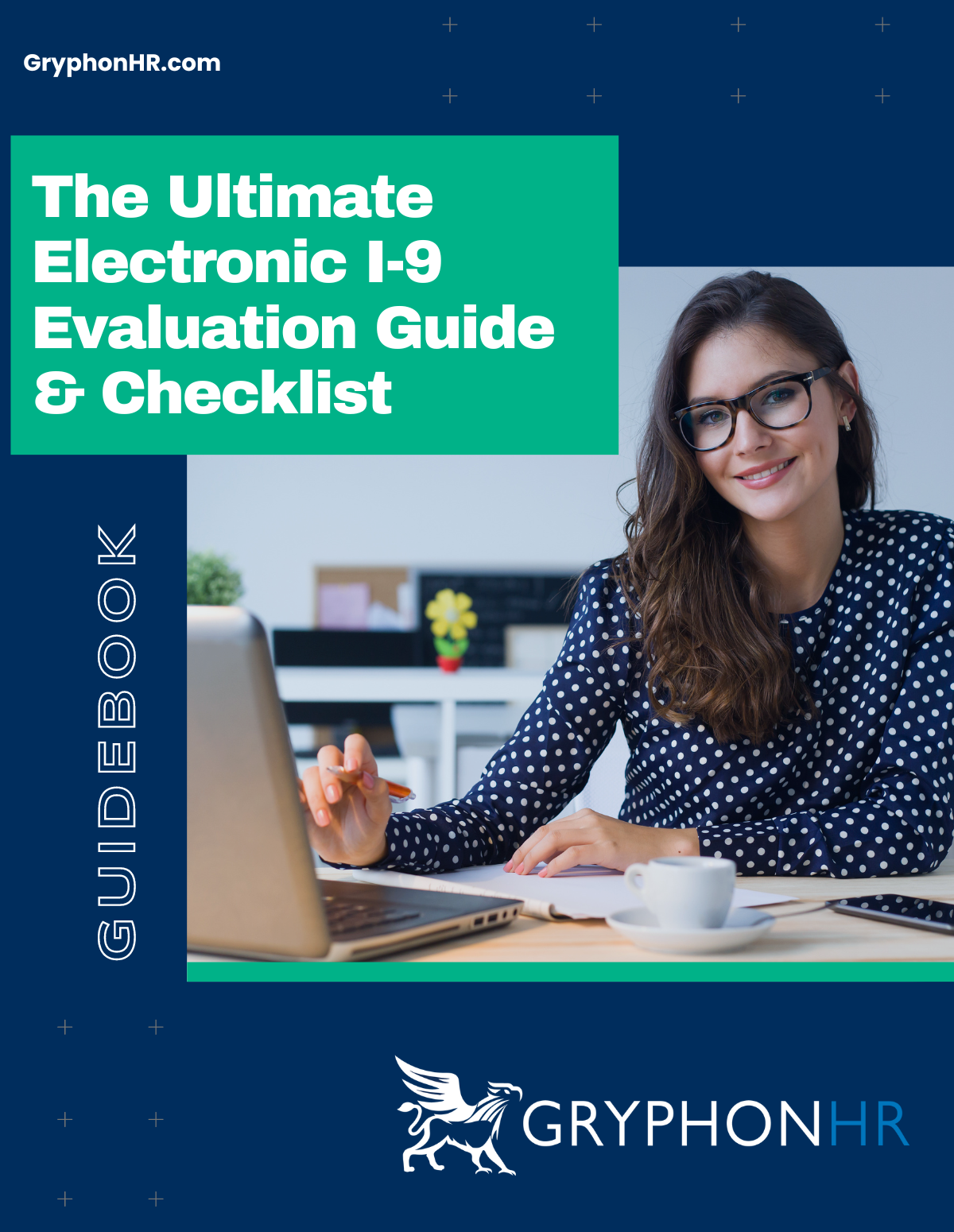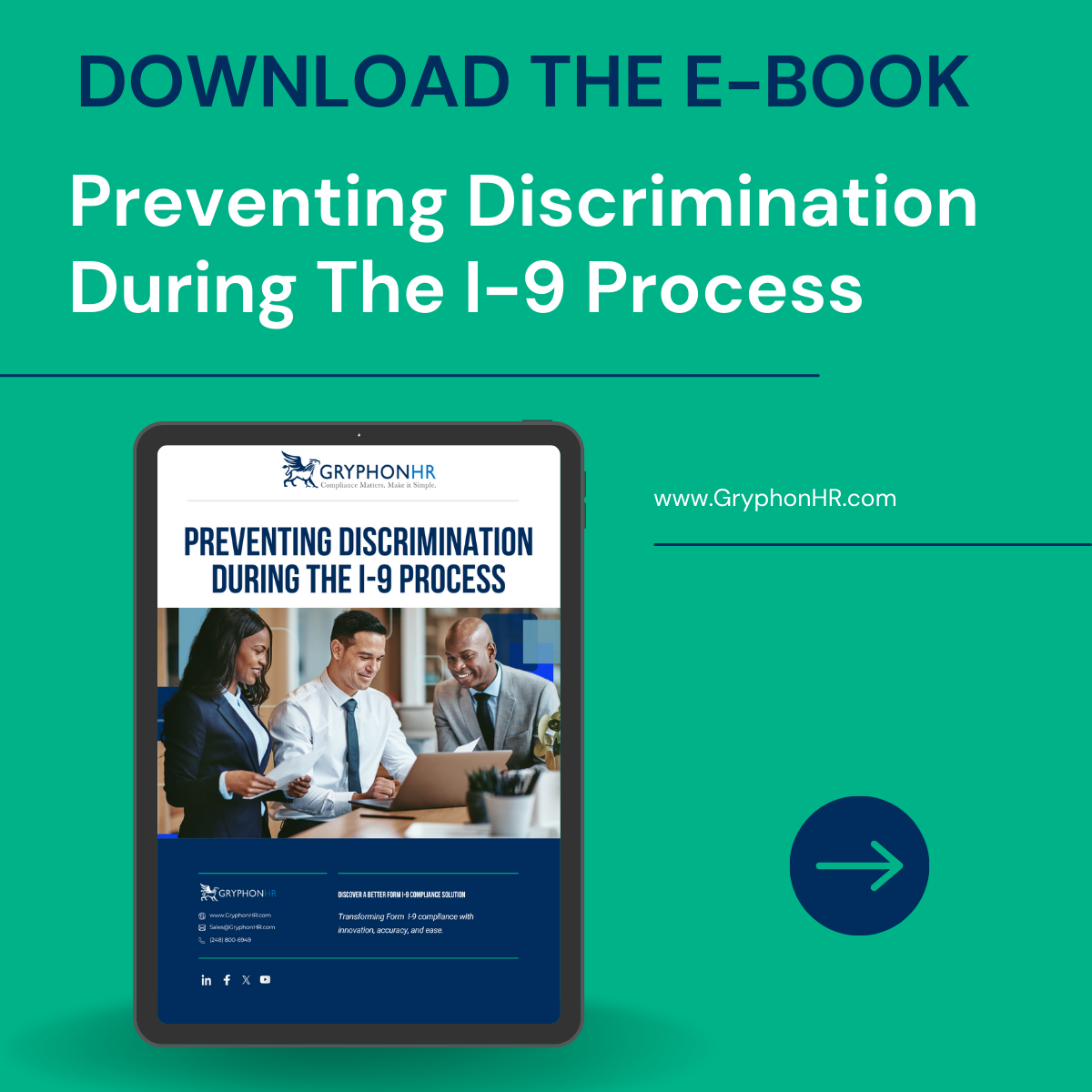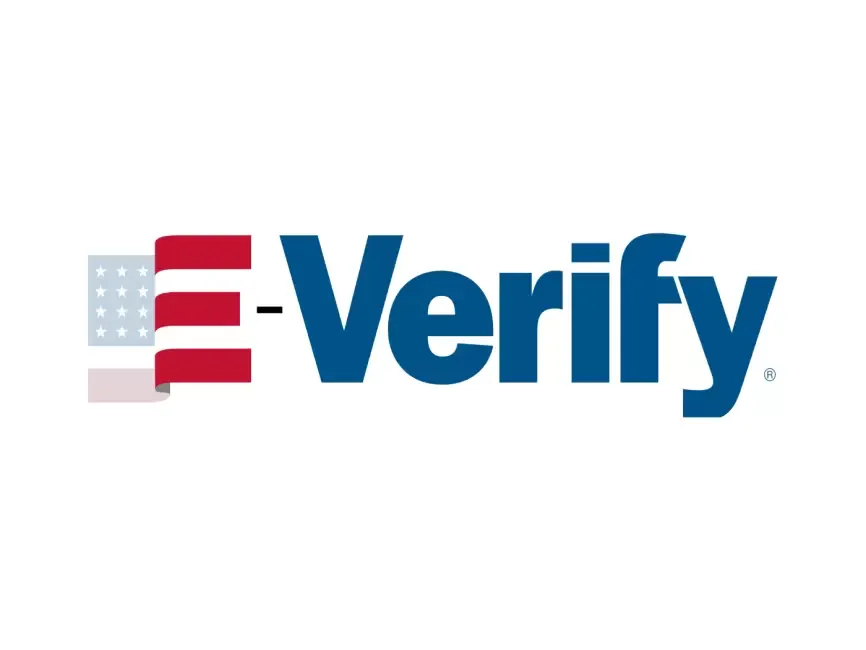Authored By: GryphonHR Blog Contributor
GryphonHR blog contributors include , consultants, researchers, and other subject-matter experts who’ve written content for our blog.
April 30, 2023
The Form I-9 is an essential document used to verify the identity and employment eligibility of individuals hired for employment in the United States. Recent settlements between the Department of Justice (DOJ) and employers demonstrate the costly consequences of non-compliance with Form I-9 requirements, including discrimination. Employers who fail to properly complete and maintain Form I-9 for their employees’ risk significant financial penalties, as well as potential liability for discrimination. In this blog post, we will explore the growing trend of DOJ settlements with employers for violations of Form I-9 requirements and the consequences of discrimination during the I-9 process.
Although, administrative compliance procedures to properly complete, store, and retain Form I-9 and related documents should remain a top priority for HR and staffing professionals, paying heed to anti-discrimination practices during the hiring process should also be considered.
For example, requiring specific documents to verify identity and work authorization from only certain employees can be considered discriminatory; this includes documents such as passports or driver’s licenses. In addition, examining documents too closely and failing to use good faith efforts when reviewing a potential employee’s form can also give rise to discriminatory claims.
Under The Immigration and Nationality Act (INA) employers cannot discriminate based on citizenship, immigration status or national origin at any stage of the hiring process, unless required or allowed by law.
1. April 2023, In a settlement reached with a Boise, Idaho manufacturer, the DOJ determined that the employer unlawfully preferred a temporary visa worker for the position, failing to meaningfully consider the U.S. citizen’s qualifications. Under the settlement, the manufacturer is ordered to pay a civil penalty to the United States and offer back pay totaling $85,000 to the affected worker. Additionally, the company will train its staff on the INA’s anti-discrimination provision, change its policies and procedures and be subject to departmental monitoring for a two-year period.
2. April 2023, The DOJ determined that one of the “Big Three” automotive manufacturers unnecessarily required lawful permanent residents to provide an unexpired foreign passport as a condition of employment, imposing a discriminatory barrier on them in the hiring process. Under the terms of the agreement, the auto maker will pay $365,000 in civil penalties to the United States. The agreement also requires the employer to train personnel on the INA’s requirements, revise its employment policies and be subject to departmental monitoring and reporting requirements.
3. April 2023, The DOJ’s investigation of a restaurant franchise in Florida began when a worker, a non-U.S. citizen, complained that the franchise refused to accept her valid documentation proving her permission to work and demanded additional documentation. Although she had permission to work in the United States, she was not able to obtain one of the documents that the employer required because of her citizenship status. Employers must allow workers to present whatever acceptable documentation the workers choose and cannot reject valid documentation that reasonably appears to be genuine. The settlement requires the franchise to pay a civil penalty to the United States, provide backpay to the worker who filed the compliant, train staff on the INA’s anti-discrimination provision and be subject to departmental monitoring for a period of three years.
4. January 2023, A Minnesota based staffing firm was ordered to pay a civil penalty of $250,000 to the United States, and $100,000 for a back pay fund to compensate victims of the staffing company’s alleged discriminatory practices. The DOJ investigation determined that the staffing firm routinely required specific documents from newly-hired non-U.S. citizens to prove their permission to work in the United States.
In a recent press release the Justice Departments Assistant Attorney General, Kristen Clarke, stated, “When employees present legally acceptable documentation to demonstrate their permission to work, employers cannot demand different or additional documents because of the employees’ citizenship or immigration status.” The Justice Department will continue the important work of ensuring that workers do not face unlawful barriers to employment.”
The DOJ settled with several employers in recent months and years. The trend of investigations conducted by the Immigration and Employee Rights (IER) section of the DOJ, shows no signs of slowing down. Employers should be sure to make every aspect of compliance with employment eligibility and verification a top priority.
Providing appropriate training for staff on proper Form I-9 completion techniques can help prevent any unfortunate discrimination allegations from occurring. To ensure compliance with Form I-9 requirements it is essential for employers to keep up with federal guidance from agencies like the DOJ and The Department of Homeland Security (DHS) as well as other state laws or regulations governing E-Verify. By doing so, organizations can help to protect themselves from costly fines associated with improper employee verification procedures.
As mentioned in IER’s guidance: “Employees do not need to prove their citizenship status to employers when they complete the Form I-9. Asking an employee for proof of citizenship or immigration status could violate the law at 8 U.S.C. § 1324b(a)(6). For example, asking an employee who marks “U.S. citizen” to present a naturalization certificate or U.S. passport, or asking a lawful permanent resident (LPR) to present a Permanent Resident Card (PRC) could be unlawful discrimination under this part of the law.”
Furthermore, it is important for HR and staffing professionals to keep their hiring processes uniform and consistent. An electronic I-9 platform can help employers to ensure that documents are properly verified to help avoid discrimination. Contact us to learn more about how GryphonHR can help to ensure compliance requirements are met throughout the entire Form I-9 and E-Verify process.

Authored By: GryphonHR Blog Contributor
GryphonHR blog contributors include , consultants, researchers, and other subject-matter experts who’ve written content for our blog.
Stay updated on Form I-9 and E-Verify!


Is your I-9 compliance software placing you at risk? Learn more about the compliance requirements for electronic I-9 systems and how to evaluate important features. Skip the form and download this interactive guide!

Avoiding discrimination during the Form I-9 process is critical to preventing liability, hefty fines, and unfair hiring practices. Download our free e-book to learn more.



MENU
STAY CONNECTED
Join our newsletter to learn more about Form I-9.